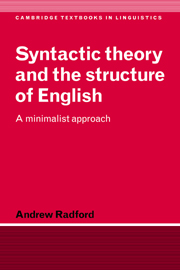
-
Select format
-
- Publisher:
- Cambridge University Press
- Publication date:
- June 2012
- July 1997
- ISBN:
- 9781139166706
- 9780521471251
- 9780521477079
- Dimensions:
- (228 x 152 mm)
- Weight & Pages:
- 0.996kg, 572 Pages
- Dimensions:
- (228 x 152 mm)
- Weight & Pages:
- 0.909kg, 572 Pages
You may already have access via personal or institutional login
Book description
Andrew Radford's textbook is written for students with little or no background in syntax, and introduces them to key concepts of Chomsky's minimalist programme (e.g. merger and movement, checking, economy and greed, split VPs, agreement projections), as well as providing detailed analysis of the syntax of a range of different construction types (e.g. interrogatives, negatives, passives, unaccusatives, complement clauses). Illustrative material is drawn from varieties of English (Standard English, Belfast English, Shakespearean English, Jamaican Creole and Child English). There is a substantial glossary and an extensive integral workbook section at the end of each chapter with helpful hints and model answers, which aim to get students to analyse phrases and sentences for themselves within a minimalist framework.
Reviews
"...Andrew Radford's new book is so welcome. ...an easy and painless way for philosophers to bring themselves up to speed on developments in Chomsky's minimalist syntax.... ...the book very effectively presents the emerging consensus within minimalist sybtax, and provides the necessary background for pursuing topics in the primary literature. I highly recommend it to my fellow travelers in linguistically-minded philosphy of language." Robert J. Stainton
"...for those who want to go beyond the surface of word order patterns and morphological amrking, digging for deeper insights into the syntax of a language, Radford's book will certainly be of help. ...linguists working with a functionalist orientation might find it interesting to know how the Minimalist Program combines formal syntactic representations with the functional concept of economy." Joost Zwarts, Notes on Linguistics
Contents
Metrics
Altmetric attention score
Full text views
Full text views help Loading metrics...
Loading metrics...
* Views captured on Cambridge Core between #date#. This data will be updated every 24 hours.
Usage data cannot currently be displayed.
Accessibility standard: Unknown
Why this information is here
This section outlines the accessibility features of this content - including support for screen readers, full keyboard navigation and high-contrast display options. This may not be relevant for you.
Accessibility Information
Accessibility compliance for the PDF of this book is currently unknown and may be updated in the future.


